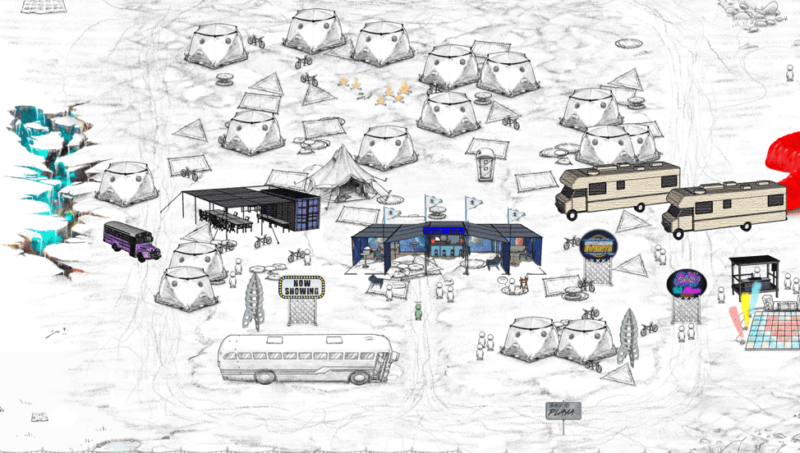Opinion
Removing barriers
What one Hillel learned from 2020’s Burning Man & scholarly research
In Short
The Burning Man approach leaned on research-based practices that combat mental fatigue, increase ownership, and build community
Dare I say that the most dedicated young adult, hipster community interrupted by the pandemic were the “Burners,” members of the Burning Man community.
Their vision is to bring experiences to people in grand, awe-inspiring, and joyful ways that lift the human spirit, address social problems and inspire a sense of culture, community, and civic engagement. It’s tough to fill their vision when in a pandemic. When Burning Man was “canceled” for 2020, the Burners found another way. They created better than Zoom online gathering technologies to recreate the Burning Man experience.


Courtesy
So too, did I find that Hillel directors needed to go beyond Zoom. One such Hillel director, knowing that his constituency needed something hipper, fresher, and newer than their boring online classes, put together a student task force to find the “latest and greatest.”
Gilad Skolnick reached out to me with the idea of incorporating this gathering into the Northeastern Career Up Now community. Career Up Now has worked with Northeastern Hillel for the past three years, and we didn’t have the momentum to decrease while we sat through a pandemic.
Our essential question: How might we create a gathering of current students and alumni that connected them in a meaningful way both professionally and to Israel, which could be a future for our hybrid programs transitioning into in-person programs for the coming year?
The Northeastern Hillel Student’s Answer: Take a page from Burning Man: Use the platform that Burners developed, apply it to the college setting, and lean on their transition plan.
Research Indicates, “Online frontal-programs have negative impact on the health and wellbeing of students.”
Jump back to the early 1980s, where studies showed extended online learning increases students’ risks of emotional, mental, and physical fatigue (Wang, Luo, Gao, & Kong, 2012; D’huvetter, 1987)). Since our students were fatigued already and “Zoomed out,” we needed to innovate.
The Burning Man approach leaned on research-based practices that combat mental fatigue, increase ownership, and build community.
Naturally, this is what Gilad and his students created.
The Results of the Hybrid-Approach Created by Northeastern Hillel Students
The following is what we found from our first hybrid-gathering:
- 80% of Northeastern Hillel alumni who are part of the Career Up Now community participated as mentors, and this had a positive impact on the students; and because of this the majority of students indicated they would stay involved with Hillel when they graduate.
For example, one post-survey response from Logan Meda, a second-year health science and psychology major, expressed how he could envision himself giving back and staying involved with Northeastern Hillel through these ongoing interactions with successful alumni who graduated in the past five years.
Global Attendance
Over 50 students and alumni from three different continents participated in the gathering facilitated and organized by Shira Hartman, Northeastern’s Hillel’s IACT Coordinator, and the student leadership team.
Meaningful Relationships
In the words of Jake Janowski, NU’s former AEPi Vice President and Northeastern Hillel President:
“I connected with friends who graduated, with other alumni, and more importantly, it helped me secure opportunities that helped me find a job.”
Getting It Done: Burning Man Style
Meet Topia.io, a “burner” created platform to bring 2020 burning man online, enabling participants to develop their own virtual worlds and interact with each other.
Since Northeastern Hillel facilitates a love of Israel, the students designed the world to be a map of Israel. The idea was that each city would be on the map corresponding to their industrial strengths. For example,
Haifa: Medtech,
Tel Aviv: Startups,
Jerusalem: Government
Negev: Sustainability
Tzfat: Creative Expression
The students created avatars to explore this “Israel World,” As their paths crossed with others, the participants’ cameras activated. They could network, have conversations with industry leaders, and participate in small groups to learn about each city in Israel and how it aligned with their career pursuits.
So, What’s Next?
Northeastern Hillel’s Career Up Now community will take a hybrid model going forward to keep alumni and students engaged in this online adventure. At the same time, Northeastern Hillel will transition the experimental layout of this “Israel World” to create engagement stations both online and in-person.
Answering the Transition Question
Northeastern’s Hillel has answered their question of “How might we incorporate what we have done and learned during the pandemic to increase student and alumni engagement worldwide.”
As the executive director of a partner organization, I’m thrilled that this approach removes the barriers for students and alumni hungry for Israel and Jewish connections not impeded by borders or distance.
Isn’t that what we want and need for a sustainable Jewish future?
Bradley Caro Cook, Ed.D. is the co-founder and executive director of Career Up Now and a Schusterman ROI Community member. He is the author of Choosing Judaism: 36 Stories and many eJewishPhilanthropy op-eds on Jewish innovation. He can be reached at bradleycooks@gmail.com.
References:
D’huvetter, K. (1987). Mental fatigue: The effects of time on task and mental workload on event-related potentials, subjective ratings, and task performance (Doctoral dissertation, California State University, Long Beach).
Mangis, J. (2016). Online learning and the effects on functional health: a pilot study. Available from: https://dc.ewu.edu/cgi/viewcontent.cgi?article=1386&context=theses
Roberts, K. D., Park, H. J., Brown, S., & Cook, B. (2011). Universal design for instruction in postsecondary education: A systematic review of empirically-based articles. Journal of Postsecondary Education and Disability, 24(1), 5-15.
Wang, L., Luo, J., Gao, W., & Kong, J. (2012). The effect of internet use on adolescents’ lifestyles: a national survey. Computers in Human Behavior, 28, 2007-2013.
Wiederhold, B. K. (2020). Connecting through technology during the coronavirus disease 2019 pandemic: Avoiding “Zoom Fatigue.”












